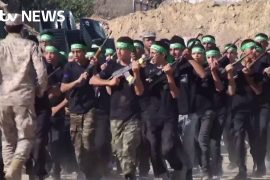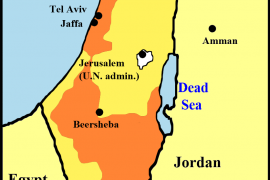Here’s the relevant text in a report on the ITV News website titled “It’s been 15 years since Israel’s West Bank wall was declared illegal, so here are 15 key moments since 2004”:
It’s been 15 years since the International Court of Justice [ICJ] said Israel’s building of a barrier in the occupied Palestinian territory was illegal – demanding the construction stop immediately and the state pay reparations to those affected.
A decade and a half on from the request, delivered on 9 July 2004, the wall is still standing.
It is more than 700km long (440 miles), is as tall as 8 metres (26ft) in places, 3 metres thick (10ft) and sometimes cuts 18 miles into land Palestinians call home.
The wall has been the focal point for flashpoints throughout its construction, so here are 15 key moments in the Arab-Israeli conflict to occur since Israel rejected the court ruling in The Hague as irrelevant.
The United Nations’ court said the construction by Israel of a barrier in the occupied Palestinian territory broke international law.
It ordered the work to cease, stating cost reimbursed for any damage caused.
It recommended the UN should should consider what steps to take “to bring to an end the illegal situation resulting from the construction of the wall and the associated regime, taking due account of the present Advisory Opinion”.
But Israel ignored the ruling and continued to build the wall.
Even by British media standards, this represents an egregious example of anti-Israel bias, as not a word in the report even alludes to Israel’s motivation for erecting the security barrier – the 2nd Intifada’s campaign of Palestinian suicide bombing that claimed the lives of hundreds of Israeli civilians in the early 2000s.

Not only are the words “terrorism”, “attack”, “suicide bombing” and “intifada” all absent from their section on the barrier, but the report turns reality upside down in their caption under a photo of the barrier which reads: “Part of the wall between Israel and Palestine, which has caused much conflict”. Of course, the wall didn’t cause the conflict. It was the RESULT of the conflict.
By contrast, even the Guardian, when reporting on the barrier, will note the stated purpose for its construction.
Regardless of ITV News’s view on the fence, and the significance of the ICJ advisory opinion, basic journalistic standards of fairness and objectivity demands that readers be informed why it was built: as a measure to protect against future terror attacks.
ITV News doesn’t have a clear complaints process, so we’ve tweeted ITV News editors in an attempt to have relevant text added to the report.





